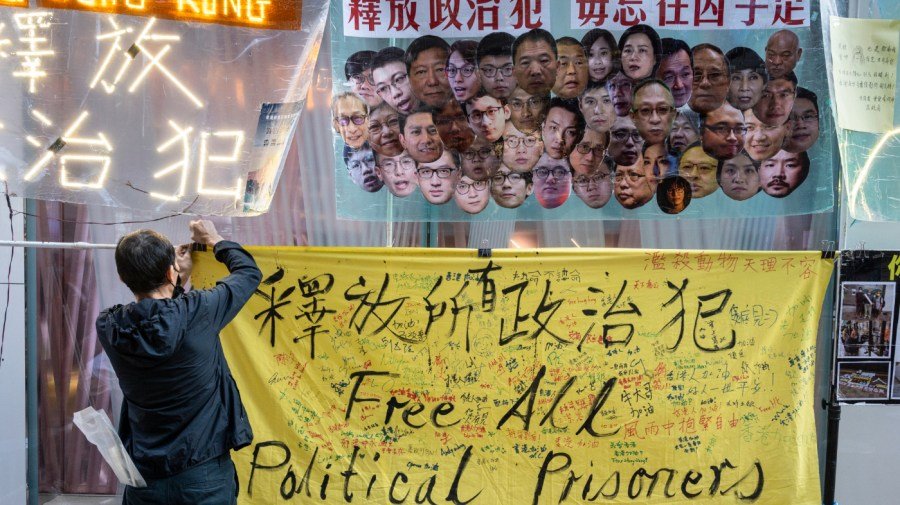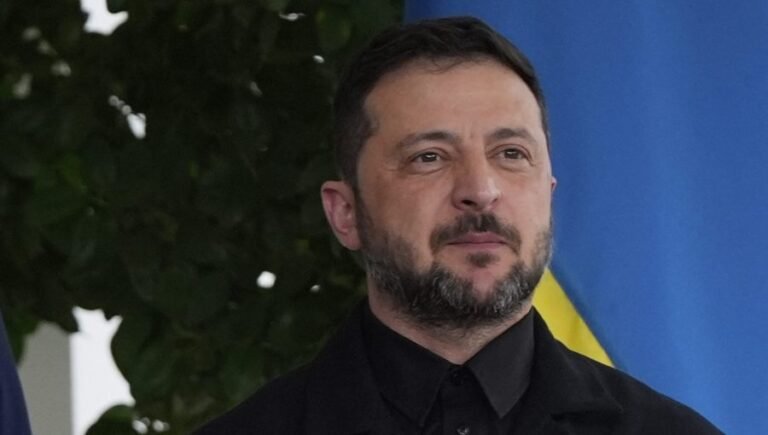
The People’s Republic of China celebrated its founding on Oct. 1, and the leader of Hong Kong — a city that prides itself on being a global financial center — has set his sights on “high-quality development with high-level security” under Chinese Communist Party rule.
But Hong Kong Chief Executive John Lee’s National Day speech and the red-flagged celebrations that accompanied it hide the fact that Hong Kong is now a city where dissent is silenced, and political opponents languish behind prison walls.
I would likely have become one of those prisoners, if I hadn’t left Hong Kong in 2020, when the Chinese Communist Party imposed the draconian National Security Law to completely eradicate pro-democracy voices. I said goodbye to friends who number among the nearly 2,000 political prisoners jailed since 2019 — most held for years without trial. Nearly 800 remain behind bars today.
Authorities censor and confiscate their letters, monitor visits and retaliate with solitary confinement or psychiatric detention — measures designed to erase prisoners’ identities and sever their ties with the outside world.
I feel closer to them than ever: Over the last six months, I spoke with more than a dozen former prisoners, lawyers and families of those still behind bars to understand their conditions inside.
Together with open-source research, my colleague Samuel Bickett — himself a former political prisoner in Hong Kong — and I compiled these accounts into an investigative report, “‘We Were Made to Suffer’: Systemic Abuse and Political Control Inside Hong Kong’s Prisons,” for the Committee for Freedom in Hong Kong Foundation.
The stories we collected were horrific, revealing what the city’s prison gates are meant to hide: systemic abuse that violates both international and local standards.
Beginning in 2021, the Correctional Services Department launched a “deradicalization” program, forcing prisoners to attend pro-Communist Party lectures, watch propaganda films and undergo “confessional” counseling sessions designed to make them renounce their beliefs. Authorities claimed 99 percent of prisoners who participated in the pro-democracy protests voluntarily took part in the program. But prisoners face implicit threats and punitive consequences for refusing.
Solitary confinement has become routine retaliation — whether for protesting in the court, being visited by people the corrections department dislikes or for simply receiving “too many” letters. International standards prohibit solitary confinement beyond 15 days, yet in Hong Kong, its use has dramatically increased since 2020, with 42 percent of such cases exceeding one month in 2024.
Pro-democracy advocate and publisher Jimmy Lai, 77, has endured years in solitary, spending more than 23 hours daily in his cell with minimal exercise and only a sliver of natural light through a small window. Former lawmaker Leung Kwok-hung has been assigned no neighbors in adjacent cells, made to work alone and moved through the prison shrouded by tarps.
The abuse goes beyond isolation. “Andrew,” arrested at 17, survived months of sexual violence at the hands of another inmate while guards looked away. “Hell on earth,” he told me. Others echoed his pain, suffering physical punishments and sexual abuse as routine methods for controlling prisoners, particularly juveniles.
Medical neglect is appalling: One foreign prisoner died after staff refused to treat him. For most inmates, injuries and illnesses are dismissed or ignored. In stifling summer heat without air conditioning, inmates develop rashes and heat problems. Toilets don’t flush; water leaks from ceilings; pests are ubiquitous.
Since leaving Hong Kong, letters have become my only connection to friends behind bars. Yet it takes weeks or months for the prisoners to receive them — if they arrive at all. Guards review every line of political prisoners’ correspondence, sometimes confiscating or shredding mail without explanation. Prisoners spend each day wondering if the world has forgotten them.
We haven’t, and we must not.
Earlier this month, a coalition of 50 organizations worldwide joined in calling for decisive action on Hong Kong’s prison conditions. Democratic governments and the United Nations must demand unimpeded access to prisons for independent monitoring. They should insist on ending solitary confinement beyond 15 days, ensuring medical access that meets international standards and conditioning economic and political engagement with Hong Kong on measurable improvements, including the release of political prisoners.
Five years ago, Hong Kong’s streets rang out in protest; now, the silence is deafening. The Chinese Communist Party wants the world — especially business leaders — to forget these prisoners, hoping to restore its global reputation. Meanwhile, political prisoners, hidden from public view, are fed the narrative that the world has abandoned them and that their cause was in vain.
When we released our report, the Hong Kong government immediately dismissed our findings without investigation, insisting that there are no political prisoners in Hong Kong. We know that isn’t so. These brave individuals have waited far too long for the world to echo their silenced horns.
As Hong Kong celebrates another anniversary of Chinese rule, we must remember those suffering in darkness and demand their freedom. Their courage in standing for Hong Kong’s future deserves nothing less than our unwavering support and action.
Frances Hui is the policy and advocacy coordinator at the Committee for Freedom in Hong Kong Foundation, based in Washington, D.C. An activist since age 14, she was the first Hongkonger granted asylum in the U.S. after the 2019 movement and is now wanted by the Hong Kong government under a HK$1 million bounty.






